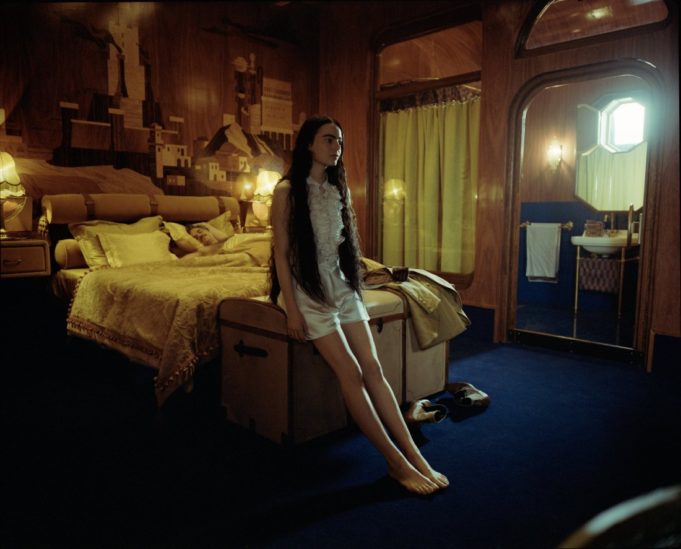What are the movies’ best takeoffs on the Frankenstein story? My inner comedy nerd says Mel Brooks’ Young Frankenstein. Bomani J. Story’s The Angry Black Girl and Her Monster, which came out just a few months ago, is really creative too. Still, I have a soft spot for Poor Things, a zany feminist take on Mary Shelley’s tale that expands to a theater near you this week. It features Emma Stone delivering the line, “I will keep my new life and my lovely old clitoris, thank you.” That alone is enough to recommend the movie for me, but there is more. In fact, there’s enough to make this one of the year’s best films.
The film is based on Alasdair Gray’s illustrated novel, and you can see how it resonated with director Yorgos Lanthimos. In London in the 1890s, biological researcher Godwin Baxter (Willem Dafoe) takes in a new lab assistant (Ramy Youssef), and the young doctor is amazed and horrified to find a young pre-verbal woman (Stone) padding about Baxter’s house. Baxter found her as a pregnant and richly dressed corpse after she jumped off a bridge to her death and, with little clue to her identity, brought her back to life by removing the brain from her unborn child and implanting it in her head. He rechristens her “Bella Baxter” and keeps her prisoner inside his mansion. No wonder she runs off with shady lawyer Duncan Wedderburn (Mark Ruffalo), who takes her to see the world. Good thing she has by that time learned to speak and stop peeing herself.
Lanthimos previously directed Stone in The Favourite, and you’ll recognize his fish-eye lenses and switching between black-and-white and color. However, this is altogether weirder, almost as weird as his earlier Greek films, with its outdoor scenes in London, Paris, Lisbon, and Alexandria that all blatantly take place on theatrical sets on a soundstage in Hungary. Godwin (or “God,” as Bella calls him) comes off as less sinister than in the book, and his house is full of hybrid creatures like a goose/bulldog and a duck/pig that are clearly his previous experiments. When Bella goes absent, Godwin performs the same experiment on another woman (Margaret Qualley), and the brain transplant doesn’t work so good. Bella proves to be too much woman for Duncan, and Lanthimos can’t resist a callback to A Streetcar Named Desire after she cuts him loose and he stands under her window screaming “Bella!”
This is easily Stone’s strangest performance, and it may be her greatest. The way she moves is compulsively watchable, as she initially walks without full control of her limbs. Later, she does a bizarre dance on the floor of a Lisbon nightclub. (Jerskin Fendrix’s appropriately weird musical score is the best I’ve heard all year.) Bella winds up having copious sex — which she at first calls “furious jumping” — not only with Duncan but a small army of men and a handful of women, as she takes a job at a brothel in Paris, motivated by both a need of cash and a spirit of scientific inquiry. Literature has had numerous examples of picaresque tales about women who fuck their way to wisdom and enlightenment, but with few exceptions (the novels of Colette, for instance), it seldom emerges as anything other than prurient male fantasy.
This time, it comes off mostly because of Stone’s performance. The scene where she brings herself to orgasm for the first time (with the camera tight on her face) is very funny, and her description of it as, “I have been working on myself to get happiness,” is as good a euphemism for masturbation as I’ve heard. Her performance is slapstick and unsettlingly childlike at the beginning, but she always gives the sense of an intelligence trying to figure out the ways of the world, even in a shattering scene when a cynical rich American (Jerrod Carmichael) exposes her to the suffering of the world. Her transformation into the mature adult at the end of the film is not only logical but inspiring.
Bella is much like Barbie from Barbie, going from obliviousness to consciousness of her place in the world and her need to figure out her own way forward despite all the Victorian men around her who want to determine that for her. The climax of Poor Things is one significant departure from the novel, as a brutish army general (Christopher Abbott) who was married to the original version of Bella comes to reclaim her as his property, hence the aforementioned line about the clitoris. The way she deals with him is typical of the high comedy in this lurid fantasia of sexual liberation.
Poor Things
Starring Emma Stone and Mark Ruffalo. Directed by Yorgos Lanthimos. Written by Tony McNamara, based on Alasdair Gray’s novel. Rated R.












